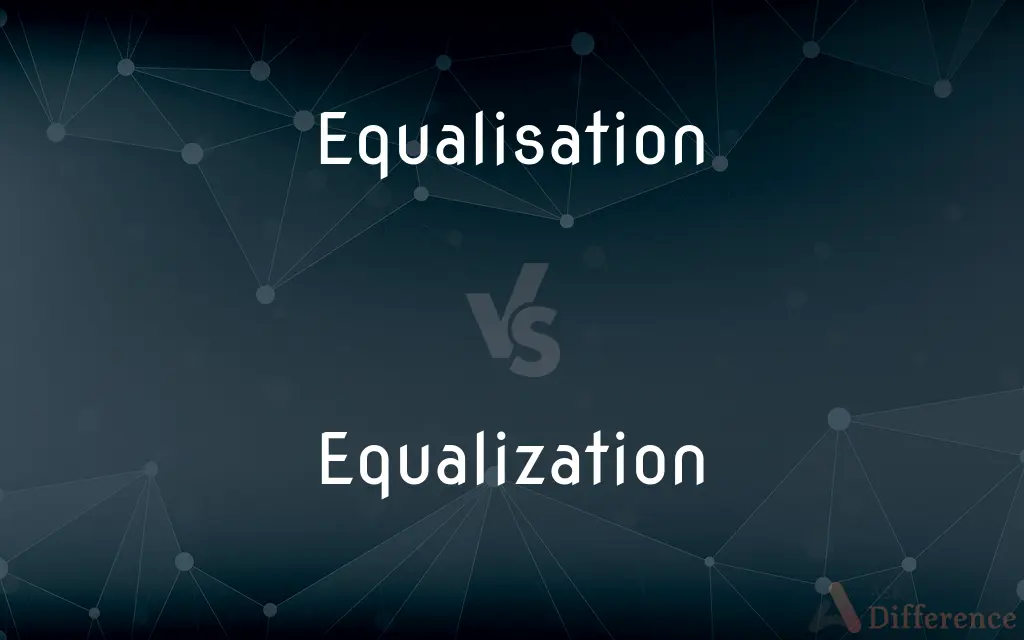Equalisation vs. Equalization — What's the Difference?
By Fiza Rafique & Urooj Arif — Updated on April 25, 2024
"Equalisation" and "equalization" refer to the same process of making things equal, differing only in spelling, while the former is British English, while the latter is American English.

Difference Between Equalisation and Equalization
Table of Contents
ADVERTISEMENT
Key Differences
Equalisation is the preferred spelling in British English, used when discussing processes that involve making things uniform or balanced. Equalization follows American English conventions, used in similar contexts such as audio engineering or finance.
When written in texts or academic papers, "equalisation" aligns with other British spellings that often include 's' rather than 'z'. Equalization, on the other hand, fits into the American pattern of using 'z', which is prevalent in words like 'realize' or 'optimize'.
In terms of pronunciation, both words sound nearly identical, with subtle differences in accent reflecting their respective English variants. Whereas the pronunciation, regardless of the spelling, centers around the core idea of achieving parity or balance.
The use of either term typically depends on the audience or the regional standards of the text or publication. "Equalisation" might appear in documents or discussions in the UK and Commonwealth countries, while "equalization" is common in the United States.
Despite their spelling differences, both terms are used interchangeably in global contexts, especially in technical fields like engineering or data processing where the concept is fundamental.
ADVERTISEMENT
Comparison Chart
Spelling
British English
American English
Usage Context
Academic papers, official documents in UK
Academic papers, official documents in US
Pronunciation
Slightly varies by regional accent
Slightly varies by regional accent
Common Fields of Use
Audio engineering, finance, data processing
Audio engineering, finance, data processing
Regional Preference
UK, Australia, other Commonwealth countries
USA, Canada
Compare with Definitions
Equalisation
Adjustment of audio frequencies to balance sound output.
Proper equalisation can significantly improve your music listening experience.
Equalization
The act or process of making equal.
Equalization of wealth among citizens remains a contentious issue.
Equalisation
The process of making things equal or uniform.
The new tax policy aims for financial equalisation among different income groups.
Equalization
The process of bringing elements to a state of balance.
The league uses point equalization to maintain competitive balance.
Equalisation
The process of eliminating imbalances.
Economic equalisation is crucial for reducing regional disparities.
Equalization
The adjustment of audio settings to achieve desired sound quality.
Audio equalization is essential in live concert settings.
Equalisation
The act of distributing resources or opportunities equally.
The government focuses on the equalisation of educational opportunities.
Equalization
The distribution of resources to ensure uniformity.
Fund equalization in schools helps ensure all children have access to quality education.
Equalisation
Balancing different elements to achieve fairness.
The tournament rules ensure equalisation in player handicaps.
Equalization
The elimination of discrepancies.
The equalization policy addresses disparities in healthcare access.
Equalisation
Alternative spelling of equalization
Equalization
To make equal
Equalized the responsibilities of the staff members.
Equalisation
The act of making equal or uniform
Equalization
To make uniform.
Equalization
To constitute or induce equality, equilibrium, or balance.
Equalization
The act of equalizing, or state of being equalized.
Equalization
(underwater diving) Maneuvers to balance the pressure in the middle ear with the outside pressure by letting air enter along the Eustachian tubes.
Equalization
(finance) Repayment to an investor in a unit trust or OEIC of an increase in the unit price to cover the seller’s entitlement to income received from the underlying investments but not yet distributed to unit holders, repaid as part of the first distribution of income to that investor.
Equalization
The act of equalizing, or state of being equalized.
Their equalization with the rest of their fellow subjects.
Equalization
The act of making equal or uniform
Common Curiosities
What is the primary difference between equalisation and equalization?
The primary difference is the spelling; "equalisation" is British English and "equalization" is American English.
In which fields are the terms equalisation and equalization commonly used?
Both terms are commonly used in fields like audio engineering, finance, and data processing.
Are equalisation and equalization pronounced differently?
They are pronounced nearly the same, with slight variations possibly due to regional accents.
Is one spelling more correct than the other?
Neither spelling is more correct; the choice between "equalisation" and "equalization" depends on regional spelling preferences.
Why do British English and American English use different spellings for the same word?
Differences in spelling between British and American English originated from various historical and linguistic developments, with American English often adopting more phonetic spellings under the influence of lexicographers like Noah Webster.
Are there any exceptions where "equalisation" might be used in American English or "equalization" in British English?
In specialized or global contexts, such as technical documents or international standards, either spelling might be used regardless of the regional preference to maintain consistency with previously established terms or practices.
What are some tools that can help determine the correct spelling to use?
Language-specific spell checkers, style guides, and dictionaries are useful tools for verifying the correct regional spelling of words like "equalisation" and "equalization."
Is there any historical reason behind the different spellings?
The different spellings reflect broader differences between British and American English that developed over the 18th and 19th centuries, partly influenced by American efforts to simplify or Americanize certain English spellings.
Can I use equalisation in American texts?
It is best to use "equalization" in American texts to align with American spelling conventions.
Does the meaning of "equalisation" or "equalization" change in legal or technical contexts?
The meaning remains consistent across legal and technical contexts, referring to the process of making things equal or balanced, though specific applications may vary depending on the field.
How do spellings like "equalisation" and "equalization" influence language teaching in different countries?
These spelling variations influence language teaching by necessitating specific instruction in the spelling conventions of either American or British English, depending on the educational context and objectives.
What are the implications of using "equalisation" in an American document?
Using "equalisation" in an American document may seem out of place and could be flagged by spellcheckers as incorrect, as the preferred spelling in American English is "equalization."
How should I choose which spelling to use in my writing?
Choose the spelling based on the primary audience of your text. If your audience is mainly in the United States, use "equalization." For the UK and other Commonwealth countries, use "equalisation."
Can the use of either spelling impact the perceived credibility of a document?
Yes, using the incorrect regional spelling can impact the perceived credibility of a document, especially in formal, academic, or professional settings where regional language standards are expected to be upheld.
In bilingual or international publications, which spelling is preferred?
In bilingual or international publications, the choice of spelling might depend on the publication's style guide or the origin of the publication. It's common to choose one spelling and use it consistently throughout to avoid confusion.
Share Your Discovery

Previous Comparison
Handling vs. Management
Next Comparison
Polity vs. PoliticsAuthor Spotlight
Written by
Fiza RafiqueFiza Rafique is a skilled content writer at AskDifference.com, where she meticulously refines and enhances written pieces. Drawing from her vast editorial expertise, Fiza ensures clarity, accuracy, and precision in every article. Passionate about language, she continually seeks to elevate the quality of content for readers worldwide.
Co-written by
Urooj ArifUrooj is a skilled content writer at Ask Difference, known for her exceptional ability to simplify complex topics into engaging and informative content. With a passion for research and a flair for clear, concise writing, she consistently delivers articles that resonate with our diverse audience.














































